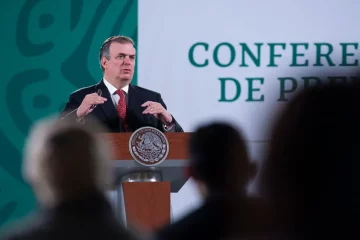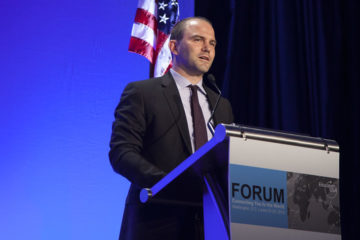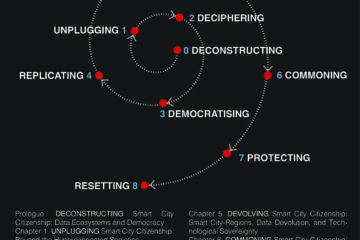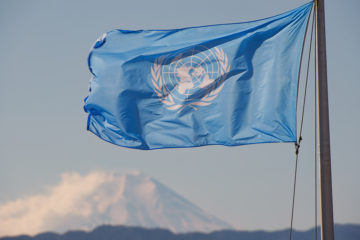
Defining the ‘right to seek political office’: The case of Mexico’s Marcelo Ebrard
On September 6, 2023, the results of the nationwide popular polls were tallied to select the next presidential candidate for Morena, Mexico’s incumbent party. Just hours before the results were announced, prominent candidate Marcelo Ebrard voiced concerns about the integrity of the counting process, calling for a complete restart. He pointed out a “worrisome” 14.4% incidence of cancelled ballot boxes in Morena’s main survey. Ebrard also accused the use of police force to prevent his supporters from placing their ballots. Furthermore, he argued that Morena had operated on a clientelist structure which conditioned citizens’ social benefits to promote support for his rival. His plea was dismissed by party leaders, who proceeded to declare Claudia Sheinbaum as the winner. Mexico’s political …

OxPol Blogcast. Women In Politics – In Conversation with Mary Ann Sieghart: Is There a Gendered Authority Gap?
OxPol Blogcast showcases research, analysis, insights, and experiences from the members of the University of Oxford’s Department of Politics and International Relations (DPIR), and specialist guests from the Oxford academic community and beyond. Are women taken less seriously than men in politics? What causes the authority gap, and how is it manifested? On this episode of the OxPol Blogcast, host Anastasia Bektimirova welcomes Mary Ann Sieghart, the author of the best-selling book The Authority Gap: Why Women Are Still Taken Less Seriously Than Men, and What We Can Do About It. Having spent three decades covering British politics as a journalist, Mary Ann draws on her observations and interviews with fifty of the world’s most powerful, successful and authoritative women to discuss the experiences and causes of the …

We Used to Do Big Things – A Review of After the Fall: Being American in the World We’ve Made by Ben Rhodes
Barack Obama’s 2008 campaign undoubtedly inspired a movement of young progressives across America, and few believed in the sprawling idealism more than Ben Rhodes, a young New Yorker who ultimately rose to become Obama’s Deputy National Security Advisor. It is this proximity to power, especially during a historic presidency, that makes Rhodes’ second book, After the Fall: Being American in the World We’ve Made, worth considering. After the Fall centers on an author grappling with a reality—in America and across the world—that has shaken his faith in the “happy democratic endings” he and Obama once held as an ultimate goal. Based on a four-year, cross-continent journey, he explores politics from Russia and Hungary to China and Hong Kong to trace …
The Politics of Living in a World of Foam
Peter Sloterdijk is a German philosopher notorious for his public spat with Jurgen Habermas, his proclamation that critical theory died in the 1990’s (much to the chagrin of Axel Honneth and other contemporary custodians of the tradition), and his gigantic three-volume Spheres trilogy, in which he presents a polemical and holistic philosophy of being, space and nature. The recent English translation of the trilogy has piqued the interest of theorists working on the interdisciplinary problems of culture, ecology and technology. His philosophical anthropology charting of the history of humanity’s self-organisation, specifically his account of “society as foam,” provides an intriguing challenge to the methodological assumptions that underpins much contemporary political theory. In the third and final volume, Sloterdijk offers a …

Jihad in the City: Militant Islamism and Contentious Politics in Tripoli- Author’s Q&A
We interviewed Raphaël Lefèvre about his new book Jihad in the City: Militant Islamism and Contentious Politics in Tripoli, available now. OxPol: What motivated you write your book? Raphaël Lefèvre: I wanted to shed light on a little-known historical event with large contemporary echo: the creation by a militant Islamist movement of an “Islamic Emirate” on the city of Tripoli, Lebanon in 1982-1985. This movement has modern parallels with the “Islamic Caliphate” created by ISIS in parts of Iraq and Syria after 2014 and with similar attempts by Al-Qaeda to create “Islamic Emirates” on the territories it has sporadically controlled recently, from Southern Yemen and Northern Mali to Northern Syria. I am not suggesting that the 1982-1985 “Islamic Emirate” in Tripoli …

Smart City Citizenship: A Techno-Political Review (of Cities and Nations)
COVID-19 has hit European citizens dramatically, not only creating a general risk-driven environment with a wide array of economic vulnerabilities but also exposing them to pervasive digital risks, such as biosurveillance, misinformation, and e-democracy algorithmic threats. Over the course of the pandemic, a debate has emerged about the appropriate techno-political response when governments use disease surveillance technologies to tackle the spread of COVID-19. Citizens have pointed out the dichotomy between state-Leviathan cybercontrol and civil liberties. Moreover, the giant technological flagship firms of surveillance capitalism, such as Google, Amazon, and Facebook, have already assumed many functions previously associated with the nation-state, from cartography to the disease surveillance of citizens. But particularly, amidst the AI-driven algorithmic disruption and surveillance capitalism, Smart City Citizenship sheds light on the way citizens …

Book Review: Richard Caplan’s “Measuring Peace: Principles, Practices and Politics”
In Measuring Peace, Professor Richard Caplan of the University of Oxford has written an insightful guide for students and practitioners of peace. The book will help those who want to understand the fundamental principles and existing practices of how to assess peace while at the same time outlining some critical political constraints. Caplan provides a succinct and clear analysis of key approaches to peace measurements, their weaknesses and ways to move forward. Due to its accessibility and policy relevance, the book also stands out among other publications that have sought to evaluate and grapple with the question of how to judge the quality of existing peace. The key aim of the book is to give peacebuilders a ‘compass’ to navigate the post-war peace …

Cultural Citizenship in India: Politics, Power, and Media
My new book Cultural Citizenship in India: Politics, Power, and Media (Oxford University Press, 2016) analyses the role which cultural participation, understood in terms of media representation, plays for citizenship. Drawing on the hypothesis of Mitra (2012), that citizenship is a two-dimensional concept, comprising of a legal right to the soil and a moral affiliation to it, the book explores the question of the ways in which people ‘belong’ to a nation as citizens. Based on the assumption that the nation is an imagined community created through discourse (Anderson, 1983), the moral side of citizenship is understood in cultural terms, and in analogy to the two-dimensional model noted above, is explored in terms of the rights and duties granted to groups …









